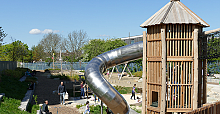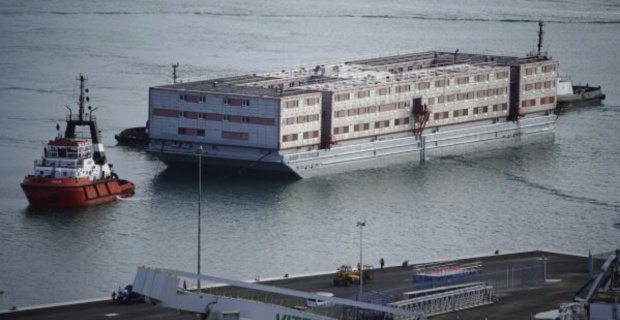As soon as one sets foot on the Isle of Portland, eyes are drawn to the stunning scenery and coastal beauty of the historically rich town on the English Channel. However, for many, it feels like a prison, as the 6 kilometers (4 miles) long by 2.7 kilometers (1.7 miles) wide isle is the new home of 500 asylum seekers, as UK authorities construct a floating barge surrounding the isle to house them until their immigration process is completed.
Keeping asylum seekers on a floating barge is another controversial migrant policy of the UK government, which aims to look after up to 500 single men for at least the next 18 months in the southwest of the country.
Portland will go down in history as the first city in the UK to host asylum seekers on a barge, known as the Bibby Stockholm, which will serve as the residence for these 500 men while they wait for asylum claims to be processed.
The British government has so far made headlines with its several policy proposals on the refugee issue, with the unsuccessful Rwanda scheme and the controversial Illegal Migration Bill.
And now, the asylum seeker barge has become the focal point of the migrant debate, with the government claiming it will save millions of pounds on hotel rooms.
'Floating prison'
During Anadolu crew's visit to the Isle of Portland and conversations with many local residents, some expressed security concerns, while others stated that such an approach is akin to being in a prison.
"People who have been through war come here absolutely terrified, and we lock them up… it's a floating prison, in my opinion. And I completely object to this plan as I find it inhumane," Paula, 72, told Anadolu.
"I'm ashamed of how my government treats others. I'm embarrassed to talk about it now," she added.
"We're all people together. Why can't we just look after each other, please?" she said, despite acknowledging that the UK has its own housing problems as well.
"However, the people who are coming here have no choice… But my heart speaks to me emotionally… I feel ashamed of what they're doing. It doesn't feel right," she said.
Another young resident of the island Sofia told Anadolu that she likes the idea that the government is looking after these asylum seekers.
"But they could probably do it better than in a boat because it just seems like they're stuck in there like prisoners," she added.
Echoing her friend, Amelia also said she is just glad the government is accommodating asylum seekers, even though she believes the government should manage this in a better way.
"So it means like they are safe, but just maybe not holding them like a prisoner," she added.
Raising concerns about safety, Peter, 72, also said: "People will have to live somewhere. The only issue is that so many people arrive on the boat and they are all men. Where are the families? Where are the wives and children?"
He said since Portland is an island, the asylum seekers must "be careful with the language I use here. We are all together as families and do community living things like that. So accepting visitors (asylum seekers) from other countries is difficult for him. It would be difficult for the people here."
"However, regardless of which government we have, they do not tell you the whole truth. It could be if it was just families, you know, just to see how things go. But if they're all men, well, it'll be difficult because they won't have any money or work," he added.
Why such a policy? And what will happen?
The number of pending UK asylum seeker cases has reached a record high, with the latest data from the Home Office indicating that over 166,000 people still waiting for a decision on their applications by the end of last year.
In addition, the numerous small boats crossing the English Channel with migrants seeking asylum are imposing significant financial burdens on the UK, on top of the existing cost-of-living crisis, with estimated daily costs coming in at £5-7 million ($6-9 million).
According to the government, facilities such as the Bibby Stockholm are "considerably more cost-effective than hotels," with reported daily expenses for food, health care, and security on this vessel amounting to £20,000 (about $25,000).
People sent to this facility will be solely single adult men aged 18 to 65 who have entered the UK illegally. The first batch of 50 is expected to arrive in the coming weeks.
Residents on the barge are not kept in detention, allowing them the freedom to come and go as they please. However, as part of port security, they are required to sign a register each time they enter or exit.
Before their arrival, residents undergo thorough robust security checks, involving searches of both UK and international databases.
To facilitate access to local services, the Home Office has arranged for bus services to transport barge residents to nearby Weymouth.
Each room will be shared by two male migrants aged 18 to 65. There will be no curfew, giving residents the freedom to come and go as they please. However, a register will be kept at reception, and there will be 24-hour security on the port premises.


 Prime Minister Keir Starmer's 2025 Easter message
Prime Minister Keir Starmer's 2025 Easter message After Nesil Caliskan a by-election will be held in Jubilee ward in Enfield
After Nesil Caliskan a by-election will be held in Jubilee ward in Enfield Publishing the analysis, Labour’s Cllr Ergin Erbil said Everybody in Enfield deserves basic rights
Publishing the analysis, Labour’s Cllr Ergin Erbil said Everybody in Enfield deserves basic rights Gaza-Israel conflict Statement from Cllr Ergin Erbil, Leader of Enfield Council
Gaza-Israel conflict Statement from Cllr Ergin Erbil, Leader of Enfield Council The European Union called on Turkey to uphold democratic values
The European Union called on Turkey to uphold democratic values Turkish citizens in London said Rights, Law, Justice
Turkish citizens in London said Rights, Law, Justice The Council of Turkish Cypriot Associations Geneva response letter
The Council of Turkish Cypriot Associations Geneva response letter Sustainable Development and ESG, Will This Become the Course for Turkic World
Sustainable Development and ESG, Will This Become the Course for Turkic World The 'Prince of Paris' has impressed in his first EuroLeague season
The 'Prince of Paris' has impressed in his first EuroLeague season Saran Media And Euroleague Basketball Extend Media Rights Partnership for Four More Years
Saran Media And Euroleague Basketball Extend Media Rights Partnership for Four More Years Will Rangers be Jose Mourinho’s next victim?
Will Rangers be Jose Mourinho’s next victim? Jose Mourinho's Fenerbahce face Rangers on Thursday
Jose Mourinho's Fenerbahce face Rangers on Thursday Barclays has become the biggest UK lender so far to cut mortgage rates
Barclays has become the biggest UK lender so far to cut mortgage rates THE SPRING STATEMENT EXPLAINED, UK ECONOMIC OUTLOOK AND GROWTH FORECASTS
THE SPRING STATEMENT EXPLAINED, UK ECONOMIC OUTLOOK AND GROWTH FORECASTS Launch of Made in Enfield gift shop to celebrate local artists and designers
Launch of Made in Enfield gift shop to celebrate local artists and designers Trial used smart Wi-Fi sensors for live building occupancy data to optimise
Trial used smart Wi-Fi sensors for live building occupancy data to optimise
















